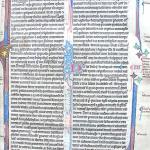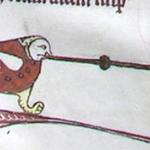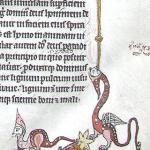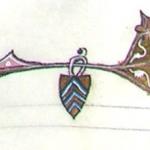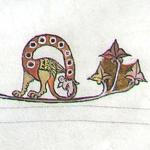BIBLIA (GISBURNE).
Vellum, 14.75 x 9.25, ff. 482 + 2, double columns of 48 lines. 13th-14th cent., finely written and ornamented.
Modern binding.
Donor, T. C. S. 2 fo. Hec a me.
From Gisburne Priory, Yorks. On flyleaf an erased inscription in large letters:
Liber sancte marie de gyseburn.
Also (xv, in large letters):
Christoferus Malton.
Also (xvi):
Christofer Lyndley of Laughton Preacher borrowed this bible ye xxth of december
1594 of mr ffawcit of yorke for one hole yeare and gave him for it in Pawnt one Angel in
gold to be restored to hym agayne when the buke is required after the twelvemonnthe.
At foot of f. 1, very neatly written:
Clausa testamenti Magri Roberti de Pykering quondam Decani Ecclesie beati Petri
Ebor. qui legauit hunc librum prioratui de gyseburn Et obiit die Jouis ultimo die mensis
Decembr. a. d. millesimo cccmo xxxiido. Item do lego Prioratui de Gyseburn. Bibliam
meam meliorem pro eo quod libri monasterii fuerunt combusti in combustione Ecclesie
sue1 ita quod faciunt anniuersarium meum singulis annis inperpetuum in Conuentu.
At the bottom of the last leaf the same in rather shorter form, in the same hand.
Collation: a2, 18 210- 4710 48 (four) 498 502.
Contents:
Prologues. a, Frater Ambrosius. b, Desiderii mei.
Genesis, etc. (at beginning of Deut. the initial is cut out).
Proll. to Joshua. a, Tandem finito. b (in margin), Ihesus filius
naue.
Prol. to Ruth (marg.). Ruth moabitis.
Prol. to Reg. unfinished, remainder supplied at the end of the book.
Proll. to Chron. a, Si lxx interpretum. b, Eusebius Jeronimus
domnioni.
Oratio manasse (with title) is 2 Chron. xxxvii.
Prol. to Ezra. Text of Esdr. i, ii, iii = Ezr., Neh., I (or 3) Esdr. (Et fecit).
Prol. to Tobit. Cromatiano (!) et eliodoro.
Prol. to Judith. Apud hebreos. To Esther. Librum ester.
Prol. to Job. Cogor per singulos.
Psalter. Gallican, no prol.
To Prov. Jungat epistola. Eccl. Memini me. Cant. Tribus
nominibus.
Sap. Liber sap. apud hebreos. Ecclus. Multorum nobis.
Isa. Nemo cum prophetas. Ier. Ieremias propheta. Lam. No prol.
Baruch. Liber iste. Ezek. Ezechiel propheta. Dan. Danielem
prophetam.
Hosea. Non idem est ordo. Ioel. Iohel filius phatuel.
Amos. Amos propheta pastor. Obad. Abdias qui interp.
Ion. Ionas columba. Mic. Micheas de morasti.
Nah. Naum consolator. Hab. Abacuc luctator.
Zeph. Sophonias speculator. Hag. Aggeus festiuus.
Zech. Zacharias memor. Mal. Malachias aperte.
Macc. Machabeorum libri duo.
Evv. Matheus ex iudea, etc.
Paul. Epp. Rom. Primum intelligere uos oportet. 1 Cor. Corinthus
metropolis.
2 Cor. Post actam penitentiam. The rest of the Pauline Epistles
have the short arguments.
Acts. Actus apostolorum nudam quidem.
Cath. Epp. Non ita est ordo. 1 Pet. Discipulos saluatoris.
2 Pet. Symon petrus. 1 Joh. Rationem verbi. 2 Jo. Usque
adeo.
3 Jo. Gayum pietatis. Jude. Judas fr. Jacobi.
Apoc. a, Johannes apostolus. b (margin), Apoc. Joh. tot habet.
Interpretationes nominum. Aaz - Zuzim, triple columns . . f. 433
Prol. in lib. Judicum. Judas eligitur . . . . . 469
Pars prologi in iiiior libros Regum ut patet supra ibidem.
Secundus prol. in lib. Tobie. Tobias filius ananiel . . . 469b
Alius prol. in lib. Iob. Si aut fiscellam.
Tercius „ „ „ In terra quidem.
Prol. in Malachiam proph. Ultimum duodecim prophetarum . 470
Primus prol. in Matheum. Matheus cum primo.
Arg. seu prol. in Ep. ad Rom. Romani sunt qui ex iudeis . . 470b
-ad pacem et concordiam cohortatur.
(Other proll. to Rom.). Epistole pauli ad romanos.
Romani sunt in partes.
Romanos nondum . . . . 471
Sicut prophete per legem.
to 1 Cor. Corinthii sunt achaici.
Chorinthus est ciuitas.
2 Cor. Postquam beatus ap.
Gal. Galathe sunt greci . . . . . . . 471b
Eph. Ephesus est ciuitas.
Phil. Philipenses sunt macedones.
1 Tim. Tymotheum instruit.
Prol. b. Jeron. super Act. Apost. Lucas anthyochensis.
eundem in Cath. Epp. Iacobus · petrus.
Iac. Iacobum qui appellatur.
„ Iac. apostolus sanctum instruit . . . . . . 472
1 Pet. Symon petrus filius iohannis.
1 Joh. Ioh. ap. et euang. quem Ihesus amauit
-iuxta eandem urbem sepultus.
Inc. liber secundus Esdre secundum hebraicam ueritatem . . 472
(= 4 Esdr. i, ii). This is C.8 in Bensly's Missing Fragment
(pp. 42, 81).
Expl. sec. lib. Esdr. sec. hebreos. tercius liber esdre patet supra
suo loco.
Hic incipiunt apocripha Esdre scilicet IIII liber Esdre . . 473
(= 4 Esdr. iii-xiv).
Inc. quintus liber Esdre . . . . . . . . 480b
(= 4 Esdr. xv, xvi).
Ends 482a.
On 482b a list in the original hand of the books, ending with
Interpretationes.
Memorial verses on the books follow, viz.:
Quinque libri moysi Iosue Iudicumque sequuntur
Ruth Regum Paralipomenon Esdras Tobi Judith
Ester Iob psalmus Salomon Philo Iesu sirak
Isa Jer Eze Dan bis sex parui makabeus
Acta Jesu paulus actus canon apocalipsis.
A principal feature of interest in this Bible lies in the marginal notes, which are by a hand nearly allied to that of the original scribe. They consist for the most part of various readings. The authorities principally quoted in the Old Testament are: he. = hebrei, an. = antiqui (sc. codices), mo. = moderni, Je. = Jeronimus, Ra. = Radulfus, glosa (the glossa ordinaria), and also two correctoria quoted as utraque correctio or prima and secunda correctio or parisiensis and (very rarely) se. (senonensis?). The Septuagint and Josephus, Rabanus, and the historia scholastica are also cited.
In the O. T. these notes are most copious (and least interesting) on the early chapters of I Chron. The Psalter is not touched.
In the N. T. there is nothing till Matt. xviii. After that Rabanus, Jerome, antiqui, Gg. (= Gregory). Also G.= grecum. This last may be quoted from a correctorium. Samples are:
On Lc. xxiv. G. dicit cleophas media producta.
On Jo. xiv. Gre. sic punctat et non cogno(uistis) me. philippe qui uidet me, etc.
At Jo. xx is a light sketch in ink of the sepulchre with the lid across it.
At Jo. xxi (sed quasi cubitis ducentis). G. quasi a cubitis a multitudine.
At Rom. xvi (asincritum et flegontum). G. assintritum phycegontam sed scen.
(? senonensis) et paris. flegontam.
At 2 Thess. ii (discessio). G. apostasia al. refugia.
At Act. xviii (cuiusdam nomine titi iusti) sic multi et prima correctio sed secunda
correctio et g. sine tyti.
At Rev. xv (uestiti lapide mundo). G. habet vesti(ti) linum mundum et candidum.
paris. uestimenti lino mundo et candido. contra omnes libri habent lapidem et glosa exponit .i. firmitate et senc lapide.
At Rev. xxii (et dominus deus spirituum prophetarum). Correctio paris. habet. sed fere ubique sine, et prior correctio.
The subject of the Correctoria of the Vulgate has been treated by Berger, Deniflé and Vercellone: but I do not think the last word has been said. My own experience of Latin Bibles leads me to say that there are few in which the Correctoria are so copiously and avowedly used as in this.
The decoration of the book is interesting, though there are no pictures. The fore-edges are all painted with shields of arms. These have lost what colour they had and are difficult to decipher, but what remains is:
At top. 1. Checky arg.? and sable ?
2. arg.? lion rampant sa.?
Front . 1. Three leopards passant.
2. The same with a label of five points.
3. Two chevrons, perhaps each in two colours: light on dark field.
Bottom. 1. A bend dexter ?
2. A fess (light), perhaps a lion rampant behind it.
At the beginning of the book is a very handsome initial (conventional foliage on gold ground) and nearly complete border. Suspended to this is, at bottom, in a small shield or, a saltire gules.
On f. 3b, in another border, is a little flag attached to a trumpet, arg. a saltire or.
On f. 4 a similar flag is or a chevronel argent (?) between two chevrons azure.
At Deuteronomy, f. 58, is a small shield or, three chevrons azure and argent.
Each book has one of these fine initials (that to Deuteronomy is missing) and grotesque figures are fairly common in the borders attached to them.
There is also a multitude of initials to the chapters, which are commonly in red with green flourishing or blue with red flourishing: very well executed.
1 This fire was in 1289.
